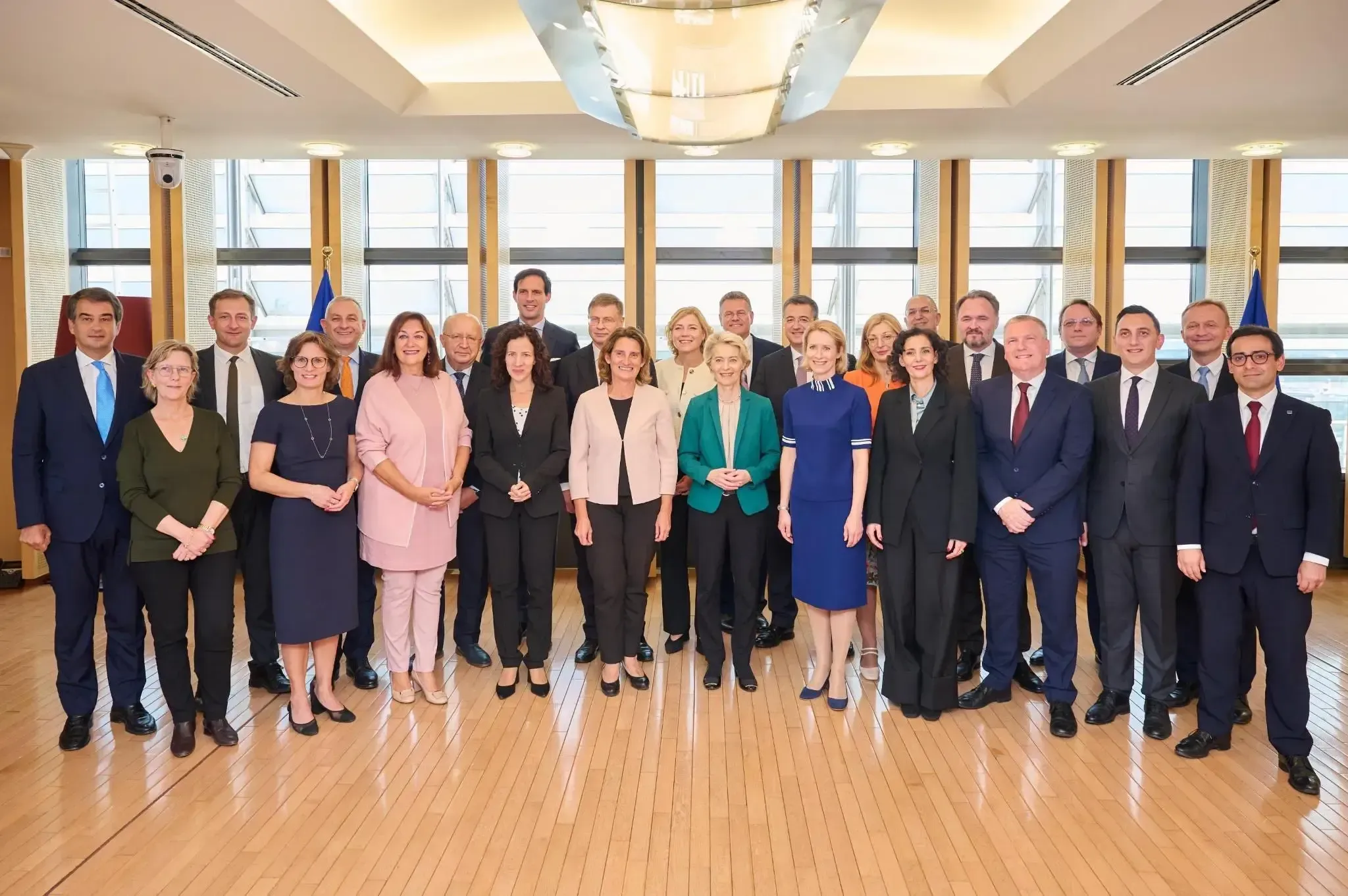

04 October 2024
On Wednesday 4 September, the European Commission published the conclusions reached by the group of experts appointed by the Commission to reflect on the future of European agriculture.
These conclusions are interesting for three reasons:
- The first is the genesis of this group and its members
- The second is the moment in which its conclusions were made public and
- The third, obviously, is its content
Before continuing, you can access the PDF of the final report by clicking on this link:
Main initiatives: Strategic Dialogue on the future of EU agriculture
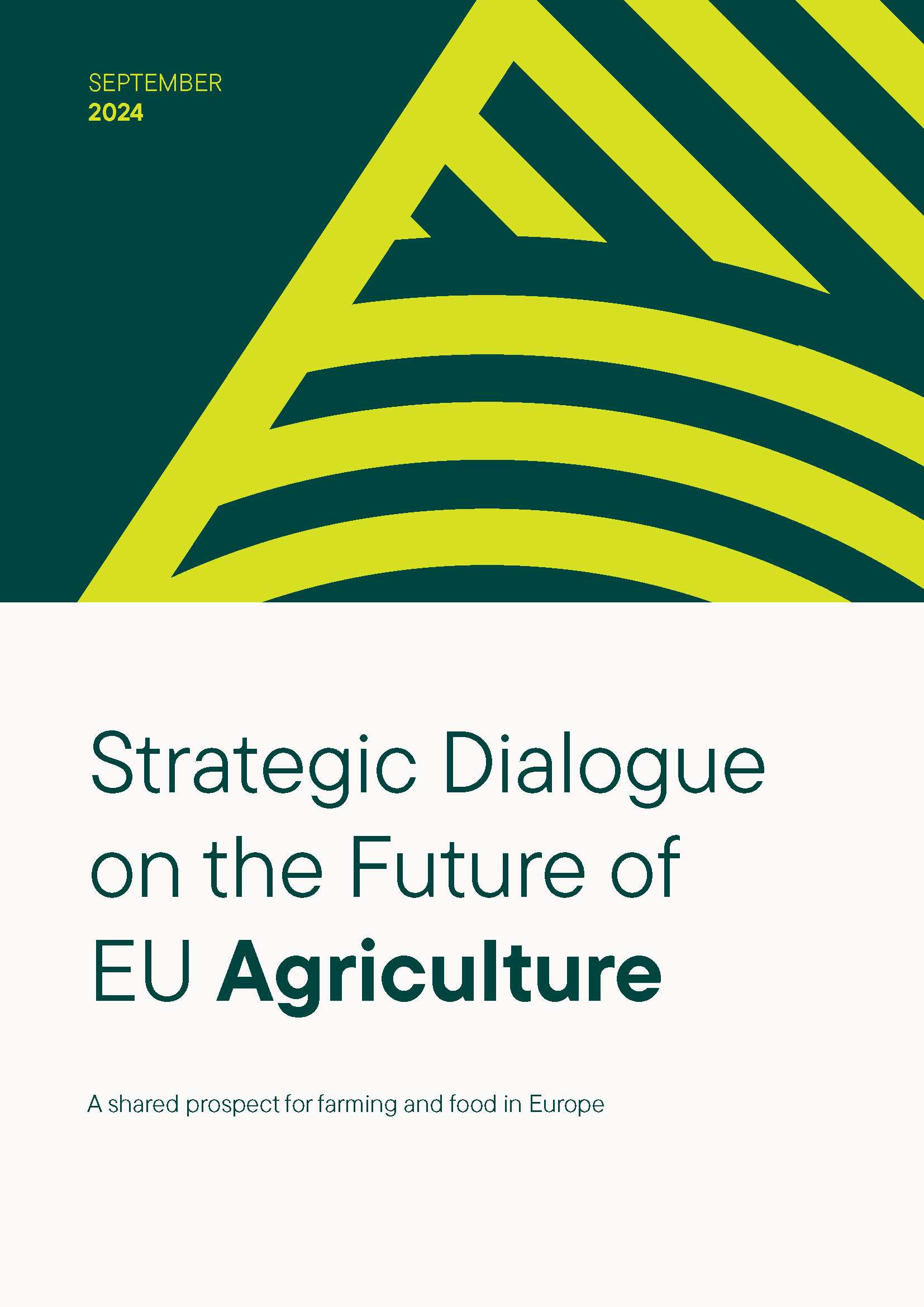
The Reflection Group
On Wednesday 13 September 2023, the President of the European Commission, Ursula von der Leyen, appeared before the European Parliament with a major speech on the “State of the Union”. She called, amongst many other issues, for “more dialogue and less polarisation” in the debate between environmental protection and the future of agriculture in the European Union, an area where political tension has increased significantly in recent times.
She insisted that “we need more dialogue and less polarisation. That is why we want to launch a strategic dialogue on the future of agriculture in the EU”. She is “convinced that agriculture and the protection of the natural world can go hand in hand.”
Three months later, at the great end-of-year mass event on European agriculture, organised by the European Commission, on 6 December, the President made her announcement and added that the initiative would begin in January 2024. In fact, the first meeting was held in Brussels on Thursday 25th of this month.
This is not, therefore, a group of experts, just another one of the many that exist within the European Institutions. It is a very institutional group of experts.
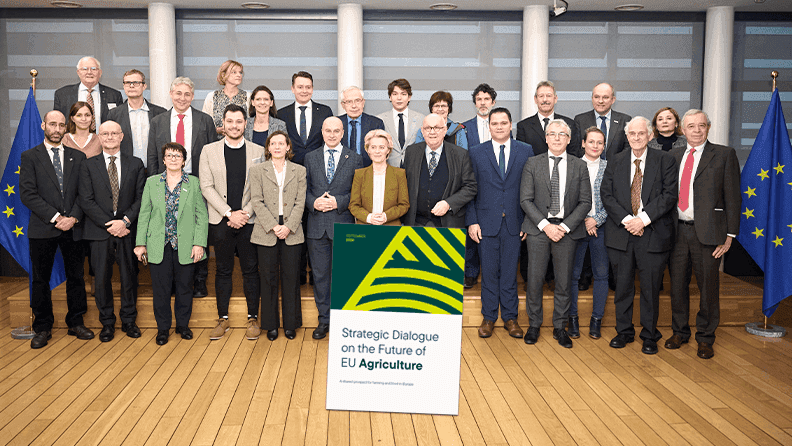
Its exceptional character is confirmed when we look at its composition. The Commission has been brave in bringing together around the table the leading actors of the sector, all presidents or general directors. We are talking (among others) about COPA-COGECA (the main agricultural trade unionism) but also Via Campesina (the small farmers ones) and the European Landowners' Organisation (the big farmers ones); the food industry (FoodDrink Europe), the retail (Eurocommerce); the environmentalists (Bird Life Europe and Greenpeace), the animal welfare activists (Eurogroup for Animals), the fertiliser and seed industries (including those producing genetically modified seeds), the organic producers, the catering companies together with Slow Food, the European Investment Bank, the cooperative banks, the food banks and the Wageningen University.
The President's Merit
All these gentlepersons have reached conclusions and recommendations, approved by consensus. Without any doubt, part of the credit goes to the figure of the group's President and his team.
The President has been the German Professor Peter Strohschneider, an Emeritus Professor at the Ludwig-Maximilians University of Munich and former President of the German Research Foundation DFG, Germany. His research focuses are on the fields of medieval and pre-modern German culture and literature as well as in academic research policy. Nothing that predisposes him, in principle, to be where he was.
However, it is true that he has already led a similar exercise on the future of agriculture in Germany. As Chairman of the German Federal Government's "Commission for the Future of Agriculture" (Zukunftskommission Landwirtschaft, ZKL), he coordinated the preparation of the Report entitled “The Future of Agriculture. A common agenda” published in 2021. As expected, this report generated contradictory, sometimes vehement, reactions from social and political stakeholders.
The first of his successes was to start the dialogue searching for all the points that the group members had in common. This allowed not only to break the ice but to create a common basis on which to discuss. If they agree on all this, let's see how they can all move forward together.
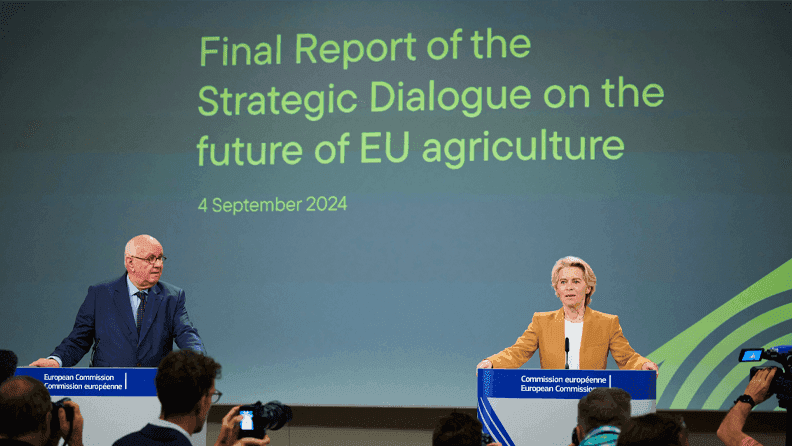
The Moment
The Group was born out of the mobilisations of farmers and livestock breeders that swept across Europe in 2023 and early 2024. Its conclusions are being published at a time when a new Commission is being prepared.
At the press conference to present the conclusions, the President of the Commission promised that these conclusions would “guide the work of the European Commission in preparing its ‘Vision for agriculture and food’ to be presented within the first 100 days of the new Commission”, that is, before Easter 2025.
Some Consensus Conclusions
Before getting into the subject matter, the report is divided into two parts. The first contains some general reflections on the future of the food chain in the European Union, highlighting that food production is an essential function in modern societies but is subject to major transformations and external tensions (such as climate change and geopolitics) and internal ones: ecological, demographic, structural, technological and changes in demand.
No one can be forced to do the impossible, but everyone must do their best to respond to these challenges. It is true that certain agricultural practices contribute, for example, to aggravating climate change, but it is also true that they can, and should, be part of the solution.
To achieve this, dialogue and cooperation between all the actors in the food system is essential. The report proposes a shared vision of the future based on the progress already made towards sustainability and animal welfare, a great diversity of production systems, and the indispensable contribution of research, innovation and extension.
The second part expresses the political principles that underpin the report. Together with its conclusions, they have the enormous merit of existing. Some are clearly agreed upon, others are more controversial and are formulated in a more cryptic language but also indicate a great deal.
Let us regroup the principles presented in two large blocks. The first is made up of principles that are truly consensual. The second regroups those that should be consensual but which, in practice, face resistance.
We will make the same classification with the proposals presented, with the exception that we will incorporate a third group, which includes the proposals that, as they are formulated, have been included in the conclusions but whose development has a lot of substance.
In this article I limit myself to summarising the gist of the report's proposals. You are invited to read the document. Believe me, it is worth it
Of course, the classification into these three groups is my sole responsibility and some measures could also fit perfectly into another group other than the one I have assigned them to.
In parentheses, I have included the page on which the measure is mentioned. Of course, I have also limited myself to collecting the essential (again in my opinion) proposals.
THE PRINCIPLES
Group 1: The Consensual Principles
- Cooperation and dialogue between all actors in the food chain is critical to achieving a fair and inclusive transition (28).
- Agricultural and food production has a strategic role in the current geopolitical context and is an essential part of our security (29).
- The importance of generational change (30).
- The market should price externalities and promote sustainability (31). Put this way, it sounds like wishful thinking, but it would be great if it could be achieved.
- Consumer information and training should be improved (31).
- The food chain should be more balanced, by promoting trust between its actors, dialogue and collaboration (31).
- The ecological transition, animal welfare and “one health” have a cost that society must assume (32).
- Innovation and research, technology can and should contribute to both the sustainability and competitiveness of the food chain (32).
- Culinary traditions reflect the diversity of our territories, contribute to rural development, promote gastronomic tourism and can contribute to improving the diet (33). The so-called “Mediterranean diet” can be a good example of this.
Group 2: The Principles That Should Be Consensual, But Are They?
- The time for change is now (27). It seems obvious, but we all know that there are social sectors and political forces that deny not only climate change and humanity's responsibility but also the need for its mitigation and adaptation.
- The need for the changes promoted and the proposals presented to be based on the best scientific knowledge available (28, 32). Unfortunately, we know that, among other things, electoral campaigns are propitious moments for “surprising proposals”, what I call false good ideas, that the tense political environment in which we live increases the recourse to demagogy and that social networks amplify both lies and hoaxes and their impact.
- The various policies must be coherent and promote synergies between them (28). In practice, divergent economic and strategic interests, as well as cultural traditions and historical ties, lead to the coexistence of policies whose real impact is contradictory.
- When assessing new technologies, there is on one hand the precautionary principle, but social, environmental and economic impacts must also be taken into account (32). Behind this cautious statement lies the whole debate on new technologies, in particular genetically modified organisms and CRISPR technology.
- Improving the diet is necessary for reasons of public health, animal welfare, environmental impact and sustainability of the food chain (33). We have already seen how sensitive the issue, in particular as far as meat consumption is concerned.
- Better animal welfare rules can create new market opportunities (33). A significant proportion of our livestock farmers see animal welfare obligations as a constraint and a cost, rather than a market opportunity.
- “Rural proofing” of any legislative initiative should be the rule, to assess its impact on rural areas (33). It should, but even when it is a legal obligation as in Spain, it is not or is merely another administrative formality.
Rural infrastructure, public transport, education and health services, internet connectivity and access to cultural and leisure services must be improved (33). We are well aware that there is a long way to go from saying to doing.
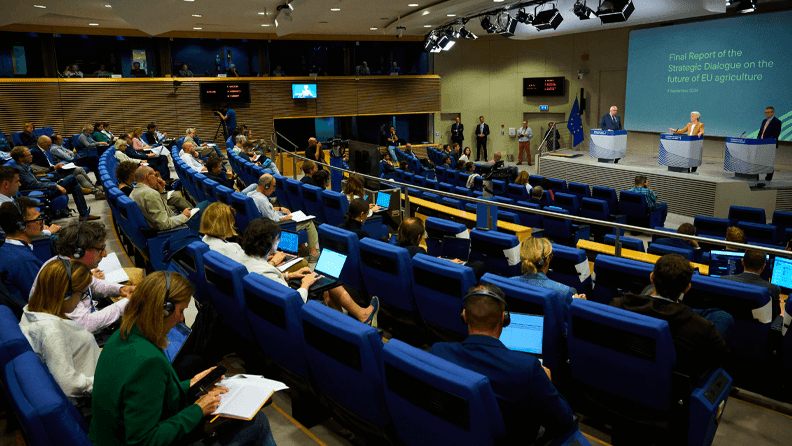
THE PROPOSALS
Group 1: Consensual Proposals
- Producer markets must be developed, which requires changes in public policies and the legal framework (38). This is not always easy, particularly when dealing with health and hygiene directives.
- The exchange of good practices and experiences between farmers, their organisations and administrations should be promoted, regarding collaboration, cost sharing and simplification (38).
- The use of shared machinery should be promoted (38).
- Farmers' training and access to market information, technology, innovation and digitalisation should be supported, with independent advisors (38).
- Short circuits should be promoted (38).
- The various national agricultural price regulations, which affect the actors in the food chain, their competitiveness and the degree of competition, should be assessed. If the assessment concludes that they have positive effects, their implementation at European level should be considered (38).
- Existing legislation on unfair commercial practices should be effectively enforced (38) and evaluated (39). Competent national authorities should be provided with adequate means (39) and should cooperate with each other, in particular when dealing with cross-border cases (39).
- The role of the food chain mediator, to resolve conflicts, deserves to be strengthened (38).
- The confidentiality of the identity of the whistleblowers must be fully guaranteed (39).
- Consideration should be given to extending the scope of the Unfair Practices Directive to catering businesses (39).
- Relevant data on production costs and prices should be available (40).
- Contracts signed between actors in the chain should include provisions specifying the additional costs and benefits associated with the most stringent European requirements relating to the environment, workers' rights or animal welfare, as well as a review clause in the event of exceptional increases in production costs (41).
- Tripartite contracts should also be promoted: farmer, industry and distributor (41).
Sustainability
- Current legislation (in particular the Water, Habitats, Birds and Nitrates Framework Directives) must be implemented and monitored. This requires clear information on what they represent for each operator and the agencies responsible must have the necessary staff for appropriate advice, communication and training (41, 43). As important as what the report says are its silences: It does not mention the law on the restoration of nature (but it does mention the need to create a fund for this issue, outside the CAP), nor the objectives of the Farm to Fork. What about the Pesticide Reduction Regulation?
- The European Commission should build a system of indicators that harmonises the different methodologies for analysing the sustainability of farms. Among others, it should facilitate the comparison of progress made in the various facets of sustainability, such as biodiversity, greenhouse gas emissions, pollution reduction, animal welfare, working conditions of workers or water quality (41); carbon sequestration in the soil (58).
- The European Agricultural Accounting Network (FADN) must be transformed into an Agricultural Sustainability Accounting Network, in order to supplement the accounting data collected in a harmonised manner until now with data relating to the sustainability of farms (41).
- The agroecological transition, and investments in animal welfare and workers' working conditions, must be the subject of a public-private partnership in which banks (including the European Investment Bank) and insurance companies must play an important role (45).
- In territories with the greatest challenges of agroecological transition, for example where there are large concentrations of livestock, territorial plans should be developed in close collaboration between local actors and regional authorities (59).
- The Commission should facilitate the adoption of practices and technologies that reduce emissions from agriculture, in particular integrated water and nutrient management, waste reduction and recycling, use of by-products, renewable energy (59, 66), precision farming, methane abatement and digitalisation (59, 65); the development of biocontrol (62); the balanced development of supply and demand for organic products (63); agroecological farming practices (64).
- Particular attention should be paid to the transition of livestock farming, with investment support, advice and training; the adoption of new technologies, paying special attention to smaller farms (65), the coexistence of extensive livestock farming with large carnivores (66).
- Water management is essential. The adoption of new varieties, crops, irrigation techniques, water storage as long as it does not damage aquifers, and practices that save and slow down the water cycle, such as hedges, flowerbeds, appropriate crop rotations, aquifer recovery, and renaturalization of riverbanks, should be supported (73).
- The Commission should map the impacts on the spatial distribution of agricultural activities of climate change and other economic, social and geopolitical transformations (74).
- European agriculture is highly dependent on certain imports (including feed and various fertilisers). The European Commission should promote policies to reduce these dependencies and encourage import substitution (74).
- The Commission should engage in dialogue with insurance companies to improve market transparency, ensure that all European farmers have access to agricultural insurance, facilitate the development of a genuine single market for agricultural insurance, and encourage improvements in the policies offered to farmers (75).
Trade
- The European Union should adopt a Food Trade Strategy covering both imports and exports, focusing on both sustainability and competitiveness (48).
- It should also support food chain stakeholders in implementing recently adopted measures with an impact on trade, such as the carbon border adjustment mechanism and the Directives on Deforestation and Corporate due diligence on sustainability (49).
- The Commission should demonstrate its leadership in multilateral negotiations to renegotiate the rules of the World Trade Organisation, seeking consensus with our trading partners in such important bodies for European food trade as the Codex Alimentarius, the FAO and the OECD, the International Labour Organisation, UNCTAD... (50).
Governance
- The Commission should institutionalise a European Food Committee in which the social partners, with the help of the scientific community, discuss with the Commission the necessary strategies for change (51). President Von der Leyen has already adopted this proposal. It represents the confirmation of the failure of the current "civil discussion groups" inherited from the old advisory committees (52).
- This Committee will periodically organize a High-Level Conference (51).
Food
- The Commission should investigate to what extent European food programmes promoting the consumption of dairy products and fruit and vegetables in schools can contribute more to promoting healthier and less resource-intensive diets (55).
- A major campaign should be launched to inform consumers of the importance of a healthier and more sustainable diet (55).
- The Commission should develop a European Action Plan for plant-based foods by 2026 (55).
- The Commission should review, and if necessary update, its labeling regulations to make them more understandable and enforceable (56).
- By 2026, the Commission should publish a report, accompanied if necessary by relevant proposals, assessing the effectiveness of national measures and voluntary commitments made by industry to protect children from the marketing of products high in fat and sugar (56).
- Efforts by industry and social partners to reformulate foods to incorporate nutritional improvements and reduce their environmental impact should be continued and, where useful, reinforced (56).
- The Commission and Member States should promote consumer access to more sustainable foods, for example through reduced VAT (56).
- Where necessary, Member States should take measures to facilitate access to healthy foods for low-income consumers, through social, fiscal or direct aid measures (56).
- Donations to food banks should be exempt from VAT (56).
Rural Policy
- The report's conclusions call for continuing, deepening and developing existing measures, putting young and emerging farmers back on an equal footing (82).
- In particular, certain rural areas with structural economic problems should be supported, focusing on the food system, in order to make the preservation of biodiversity and action against climate change economically attractive (82).
Innovation and Research
- The Commission and the Member States should promote and adequately finance participatory agricultural outreach activities and exchanges of experiences (85).
- The Commission should assess the functioning of the various farm advisory systems, accompanying this with proposals if necessary for improvements in their functioning and governance (85).
- Farmers should have access to free and independent technical advice (85).
- There is a need to increase the funding available for agricultural and food training, for innovative and experimental initiatives, especially in the case of new technologies and innovations aimed at a more sustainable food system (85).
- The procedure for authorising new products and techniques must be faster (86).
- Standards and certification procedures should be harmonised between Member States to reduce the barriers to entry faced by new products and technologies and to ensure equal treatment between all operators regardless of the region in which they are located (86).
- The Commission and the Member States should prioritise a transparent management model for data generated by digitalisation, with clear rules regarding its ownership, its operation and its ethical use (86).
- At the same time, investment in digitalisation and the infrastructure required for it across Europe must be prioritised. In particular, the report mentions (among others) precision agriculture, drones, sensors and the use of satellites (86).
- Digitalisation should be subject to robust monitoring and impact assessment, with the necessary data on usage, productivity outcomes and economic performance being available (86).
Group 2: Proposals That Should Be Consensual, But Are They?
- Measures which fragment the single market, intervene excessively in the market, limit competition and discourage investment should be avoided (37). Particularly in the field of labelling, several national initiatives are in practice hampering the free movement of goods. If information is important for the consumer, its implementation should be European and not national, let alone regional.
- Producer organisations, their associations and interprofessional organisations must be strengthened and supported in order to improve the position of farmers in the food chain (37). This is due, inter alia, to the fact that certain competition authorities (national and Community) do not accept, or excessively limit, the eligible activities, as well as to the resistance of governments and agricultural trade unions. Under the new CAP, Member States had the possibility of financing commercial producer organisations in sectors other than fruit and vegetables, and have done so in only a few cases. Since their financing would have been achieved by reducing (somewhat, but not much) the basic aid for sustainability, the farmers unions have generally opposed this.
- The possibilities opened up by the new Article 210a of the European Regulation on the Single Organisation of Agricultural Markets must be used (39). This Article exempts from being considered as restrictions of competition those agreements that are indispensable to achieve sustainability standards in the agricultural sector higher than the mandatory EU or national standards. The Directorate-General for Competition of the Commission has promoted some guidelines that must be clarified and, if necessary and based on the consequences of their application, revised. Guidelines are needed for food products not considered by Community legislation as agricultural products (39).
Sustainability
- The European Commission should build an administrative framework that reduces the bureaucratic burden on farmers (42, 52). This is easier said than done, but it is a good goal.
- Farmers who voluntarily opt for one of the certification systems should be considered as complying with existing Community legislation (42).
- The loss of agricultural land must be halted. The Commission should set a target of no agricultural land loss by 2050. The European Agricultural Land Observatory should be set up to increase market transparency, which should (among other things) analyse the various bodies and regulations of the land market (71).
Generational Renewal
- The Commission should adopt an Action Plan for the Generational Renewal of the fFod System (76). As regards the Member States, their national Plan should be adopted before the end of 2027.
- It is important to emphasise that the group of experts does not limit the need for generational renewal to the agricultural sector but rather extends it to the entire chain, in an integrative vision that should be welcomed. The expert group considers both young farmers (under 40 years old) and new farmers (77) to be equally important actors in generational change. This marks a break with the prevailing practice, which is one of the reasons for the failure of the policies followed until now. These were based on trying to ensure that the children of farmers would continue to be farmers in the future, ignoring the potential of “new farmers” not initially linked to agricultural activity.
- The expert group identifies three priorities for this Action Plan: guidelines for land mobility favourable to young and new farmers; loans to facilitate their establishment (in collaboration with the European Investment Bank); continuous training, exchange of good experiences (77), and dissemination of existing employment options in the agri-food sector (78, 79).
Taking Care of Workers
- For the first time in a European document on the agricultural sector and the food chain, the expert group has devoted a section to workers, some 30 million in total, pointing out the need to improve their working conditions and living conditions in rural areas (78, 79).
- The Transition Fund should also serve to encourage the technological transformation of agriculture, which will offer more qualified and attractive jobs (78).
- The social conditionality of CAP aid, introduced with the CAP 2023-2027, must be accompanied by incentives and advice to avoid having to apply sanctions (79). The fact that the expert group's consensus recognises the importance of this conditionality is good news, especially when voices in certain Member States and agricultural trade unions have called for its abolition.
Gender and diversity policy
- The conclusions of the expert group incorporate demands addressed to both the Commission and the Member States, relating to the situation of women in agriculture and rural areas (80).
- The Commission should ensure that Community funds contribute to tackling gender inequalities (80).
- More and better data are needed to better understand the challenges and opportunities of women farmers. In 2026, the Commission should launch a study to see how the status and presence of women can be improved, including a list of existing best practices in the Member States (80).
- An observatory should be created to monitor the working conditions of workers, particularly women (81).
Trade
- The European Union should prohibit the export to third countries of pesticides whose use is prohibited in the Union (48). So far, the rule followed is to comply with the legal requirements of the country of destination and not of the country of origin of the product. Europe is the world's leading exporter of pesticides (714,000 tonnes in 2022, of which 81,615 correspond to 41 products banned in the European Union) worth 6.6 billion Euros.
- The Commission should review both its negotiating strategies for agreements with third countries and the economic models it uses, so that they incorporate the strategic importance of their agriculture and food, as well as the obligations arising from the Paris and Montreal Agreements, the resilience of the chain and food security (49).
- It should also review the way it conducts impact assessments prior to trade negotiations. They should (among other things) assess whether third countries are able to meet high public health and environmental standards (49).
Feeding
- A “responsible” consumption of foods of animal origin can be an important component of a balanced diet, but the average consumption of animal proteins exceeds the recommendations of public health specialists (54).
- The trend towards a decrease in meat consumption in Europe is clear, as is the increase in plant-based products. It is “crucial” to support this evolution (54).
- Member States and local authorities should promote healthier diets. Initiatives such as free meals in primary schools and the promotion of nutritional education are important to this end (55).
- Public procurement should contribute to a more sustainable and healthy diet. The European Directive should be amended to enable the quality and sustainability of food to be valued in procurement contracts (57).
Group 3: Proposals That Are Even More Complicated to Implement
- Measures must be taken to ensure that producers do not systematically sell at a price below their cost of production (38). The intention is laudable, but it clashes with the definition of "production costs" and the large differences in costs between producers (EU and third country) supplying the same market.
CAP direct payments
- Support for agricultural income must be much more directed towards active farmers who need it most, particularly those who develop their activity in areas with natural constraints, small farmers, young and new farmers as well as mixed agricultural and livestock farms (43).
- A redistribution of aid is being proposed, which is highly politically sensitive. Instruments to achieve this already exist: the limitation of aid per farm and the redistributive payment. However, many Member States have not used them in their National Strategic Plans or have done so cautiously.
- Spain is the Member State that has gone furthest in limiting aid per farm, with a cap of €100,000 plus another €100,000 justifying labour costs. This affected 56 beneficiaries and transferred a total of €6 million to the redistributive payment. Spain also proposed limiting the redistributive payment to small and medium-sized active farmers, i.e., farmers whose income depends on agricultural activity for more than 20%. However, the Commission's legal services opposed this proposal.
- The technological revolution, including in agriculture, is triggering economies of scale. The Spanish National Agricultural Accounting Network data from 2018 to 2021 shows a constant improvement in the income generated by large farms and a growing disparity compared to medium and small farms.
Evolution of entrepreneurial income from the farm by UDES
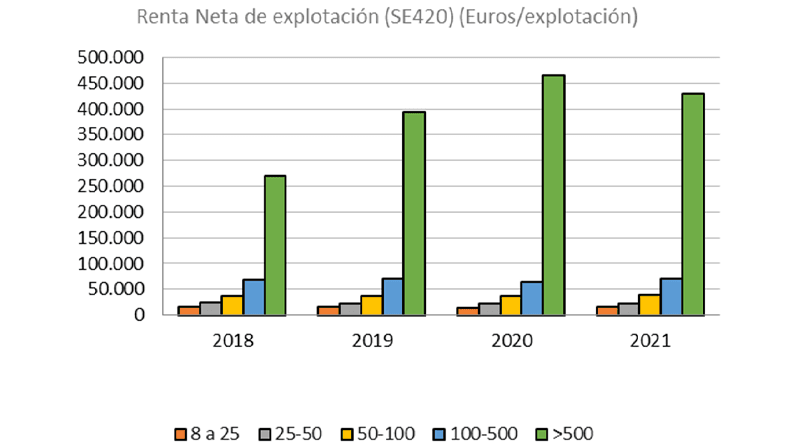
- The report proposes extending the redistribution mechanisms with new instruments such as eligibility criteria or redistributive mechanisms inspired by social policies. The Commission should promote an independent working group to assess the most appropriate mechanisms and criteria for reorienting income support, applicable for the next financial period, 2028-2035 (43).
- Income support for farmers must be conditional on their economic viability, demonstrated by a harmonised methodology (43). However, requiring beneficiaries to prove long-term viability might increase the administrative burden. Moreover, in a volatile world, it is challenging to guarantee a farm's viability in the medium and long term.
Sustainability
- Since the environmental services provided by farmers are not sufficiently remunerated by the market, farmers should benefit from specific environmental payments based on their performance, as a predictable and stable income supplement (43). This proposal is sensible but does not lead to administrative simplification for either the administration or the farmer. For administration, it requires the definition and negotiation of indicators appropriate to each objective and each territory. For farmers, this means that they need to be able to demonstrate that objectives have been met. Artificial intelligence, remote sensing, and computing can help alleviate this burden, but the resistance shown by many farmers to the implementation of the digital notebook is not a positive indicator.
- Compliance with the objectives set for environmental measures must be jointly monitored by the agricultural and environmental authorities (43). To date, this responsibility has essentially fallen on the agricultural authorities. This would require sharing responsibilities, which is not part of the culture of many administrations.
- Generic seed research must be supported and provided with a clear regulatory framework based on the best available scientific knowledge (74). The group has found an elegant formula in the face of the impossibility of reaching a consensus on genetically modified organisms and CRISPR technology.
Budget
- A temporary European fund for a just transition (43) should be created, well-endowed (57). This proposal raises many questions: Would it finance the just transition of the food chain, or be extended to other activities like mobility, housing, or other economic sectors? Where will its budget come from? Will other funds (agricultural, cohesion, research) be cut to finance it? A European debt mechanism as proposed in the Draghi Report? Who will ensure its governance, the agricultural authorities, the environmental authorities, or both?
- The available budget must be up to the ambitions (44). Currently, the European budget represents just under 1% of the EU GDP. In comparison, the Spanish budget for 2023 was 46.4% of its GDP. The EU budget could legally be increased to 1.4%, making it larger, but still relatively small. The key question is whether the increase in European ambitions will be matched by an increased budget, especially with defence policy likely to be a priority in the new legislature.
- The percentage of the budget reserved for eco-schemes and environmental measures must increase substantially year by year, covering both the income losses generated by the adoption of these measures and an incentive element (45). Increasing the environmental portion implies a “significant” decrease in the portion dedicated to basic income support, a move that was strongly opposed by many farmers’ unions during the current CAP negotiations.
- The current functioning of the crisis reserve is not satisfactory. The expert group proposes making it multiannual to deal with exceptional and catastrophic risks (75). The Commission's initial proposal suggested a reserve of 300 million Euros, additional to the CAP budget, available on a multiannual basis. However, the Council rejected this, and the reserve was maintained within the agricultural budget, with annual return of unused amounts.
- Management of the crisis reserve has improved under the new CAP starting in 2023. The reserve can now be used without altering direct payment allocations to Member States. However, the drawback is that it now functions under a “first come, first serve” system. The Dialogue suggests linking it to insurance and restricting access to those who have already used risk management tools.
Trade
- Trade policy must be consistent with the sustainability requirements that Europe imposes on its producers, with the ultimate goal that imported products are “strongly” aligned with European standards (47). The report is cautious on this point, advocating for taking into account the realities of our trading partners, promoting dialogue rather than confrontation, and respecting the rules of the World Trade Organisation (48).
Animal welfare
- The announced revision (in the Farm to Fork Strategy) of European animal welfare regulations must neither represent a lowering of current standards nor affect the competitiveness of the European livestock sector (67). This revision must be accompanied by the necessary instruments, measures, and transitional periods to allow adaptations and ensure that imports do not undermine the European sector (67).
Strategic reserves
- Europe should have crisis reserves of the main agricultural products, managed effectively to avoid undesirable effects on the market (75).
- To have an “effective” impact, these reserves must be significant, requiring a substantial budget. The Commission would need to regularly buy and sell to maintain these reserves, renewing them to prevent deterioration. Avoiding “undesirable” effects on the market seems challenging, as the transparency and complexity of the Community decision-making process would likely allow the market to anticipate the Commission's actions (both in selling and purchasing stocks).
Plataforma Tierra se exime de cualquier tipo de responsabilidad derivada del contenido publicado en el presente espacio web por sus respectivos autores. Los respectivos autores firmantes del contenido publicado en este espacio web son los exclusivos responsables del mismo, de su alcance y efectos, los cuales garantizan que dicho contenido no es contrario a la ley, la moral y al orden público, y que no infringen derechos de propiedad intelectual.

